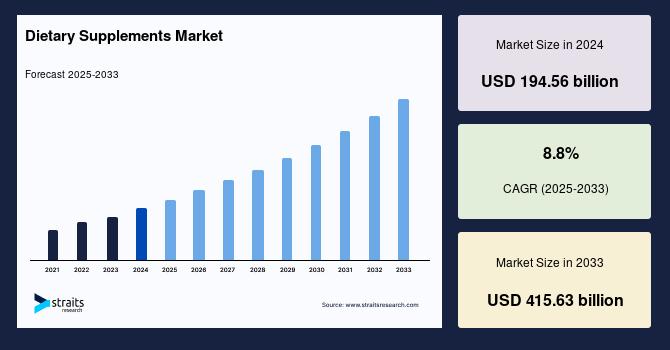The global dietary supplements market size was valued at USD 194.56 billion in 2024 and is projected to reach from USD 211.68 billion in 2025 to USD 415.63 billion by 2033, growing at a CAGR of 8.80% during the forecast period (2025-2033).
What is Driving the Growth of Dietary Supplements?
Several factors are fueling the rising popularity of dietary supplements worldwide. The increasing prevalence of nutrient deficiencies, aging populations, and lifestyle changes including busy schedules and processed food consumption have created a significant demand gap that supplements aim to fill. Consumers are prioritizing health maintenance, disease prevention, and immune system support, trends that have been accelerated by the recent global health crises.
Technological advancements in supplement formulations have enabled manufacturers to offer a wide variety of products that target specific health concerns. Innovations such as plant-based and vegan supplements appeal to consumers seeking natural and sustainable alternatives. Additionally, personalized nutrition driven by genetic profiling and lifestyle analytics is emerging as a major opportunity, enabling consumers to receive tailored supplement regimens that enhance effectiveness and customer satisfaction.
Which Regions Lead and Where is Growth Fastest?
North America remains the largest market for dietary supplements, propelled by high health consciousness, a mature wellness culture, and robust regulatory frameworks that ensure product safety and consumer trust. Approximately 80% of American adults use dietary supplements, and this number is growing steadily. Easy access through pharmacies, grocery chains, and expanding e-commerce channels further bolster this dominant position.
Meanwhile, the Asia-Pacific region is the fastest-growing market, predicted to expand at a CAGR close to 9% through 2033. Rapid urbanization, rising disposable incomes, and an increasing middle-class population contribute to this growth. Traditional herbal supplements combined with modern nutritional science create a unique market dynamic across countries like China, India, Japan, and South Korea. The region’s aging population also increases demand for supplements targeting age-related health challenges.
Europe, the Middle East & Africa also present significant growth opportunities owing to rising health awareness and government support programs that promote preventive healthcare and supplement use.
What Are the Popular Product Forms and Consumer Preferences?
Among various dosage forms, soft gel capsules and pills dominate the market because of their convenience, stability, and ease of consumption. These forms effectively mask unpleasant tastes and protect sensitive ingredients like fish oils and fat-soluble vitamins from oxidation. While powders and liquids hold important market shares, soft gels remain the preferred choice for many consumers.
Weight loss supplements constitute a major category due to increased health and fitness awareness. Consumers are drawn towards natural and organic formulations for weight management, driven by concerns over synthetic ingredients’ safety. Vitamins and minerals lead the ingredient segment, reflecting their fundamental role in physiological functions such as immune support, energy production, and bone health.
How Are Supplements Distributed and What Are the Trends in Sales Channels?
Pharmacies and drugstores are the primary sales channels globally, trusted for their product authenticity and availability of professional guidance. Consumers often seek advice from healthcare professionals before starting supplementation, reinforcing the significance of these channels.
However, e-commerce is rapidly growing with a projected CAGR near 10%. The rise of direct-to-consumer brands, subscription models, and targeted online marketing campaigns is transforming how consumers purchase supplements. Online platforms offer extensive product information, reviews, and easy purchase options, making them popular especially among younger, tech-savvy consumers.
What Challenges Shape the Market?
The industry is tightly regulated in many regions to ensure supplement safety, quality, and truthful labeling. Manufacturers must comply with rigorous standards such as Good Manufacturing Practices (GMP) and face monitoring by regulatory authorities to avoid misleading health claims. These regulations can pose barriers to entry and market expansion but ultimately increase consumer confidence.
Conclusion: The Future Outlook
The global dietary supplements market is positioned for significant growth driven by increasing awareness about health and wellness, demographic shifts, and technological progress in product innovation. Personalization, ingredient diversity, and expanding digital sales channels will play crucial roles in shaping the competitive landscape. As consumers continue to adopt preventive and proactive health measures, dietary supplements will remain a key component in global nutrition strategies, offering numerous opportunities for manufacturers, retailers, and health professionals to meet evolving consumer needs effectively.
